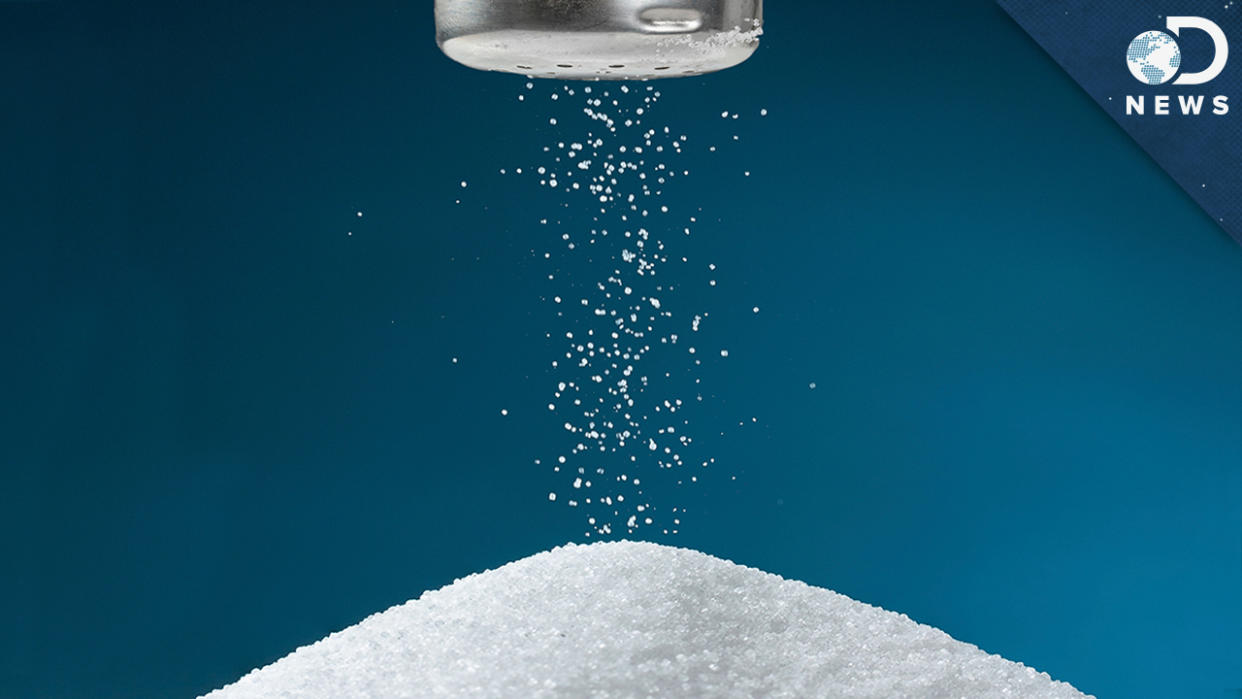6 reasons you may need to eat more salt

Toss the salt – or pass it?
Salt: A centerpiece staple, pepper's right-hand man and, most recently, public enemy No. 2 – trailing sugar in an unofficial lineup of America's most-disgraced substances. And, for pretty darn good reason: While the 2015 Dietary Guidelines for Americans suggests adults limit their sodium intake to 2,300 milligrams daily (about 1 teaspoon), most Americans over-shake that by more than 1,000 milligrams, according to the American Heart Association, which recommends consuming only 1,500 milligrams a day. Too much salt increases the risk of high blood pressure, stroke, heart attack and other conditions, it says.
Less isn't more.
But less salt isn't always better. One 2014 study in the New England Journal of Medicine found that people who ate less than 3,000 milligrams of sodium (and more than 6,000) daily had an increased risk of heart problems and early death. "There's a breaking point where above that point you start seeing harm and below that point you also start seeing harm," says Dr. Andreas Kalogeropoulos, an assistant professor of medicine in Emory University School of Medicine's Division of Cardiology, who was not involved in the study. "So there's a sweet spot."
So what's the sweet – er, salty – spot?
That's debatable. The American Heart Association contends that "there's no reliable evidence that eating less than 1,500 milligrams per day of sodium is a risk for the general population," although it may be risky for people with congestive heart failure. Meanwhile, Kalogeropoulos says a 1,500 milligram-per-day limit for older adults is impractical and not well-supported by research. His 2015 study in JAMA Internal Medicine found that sodium intake wasn't associated with 10-year mortality, cardiovascular disease or heart failure among 2,642 older adults. "A reasonable starting point for everyone" is probably about 2,300 milligrams per day, he says.
Why do we need salt anyway?
Unlike sugar, which has virtually no nutritional value, the body needs 500 milligrams of sodium daily to function optimally, according to the American Heart Association. "Sodium is such an essential mineral" in maintaining your body's fluid balance, says Jim White, a registered dietitian in Virginia and spokesman for the Academy of Nutrition and Dietetics. Too little can lead to hyponatremia, or too much water in the blood. "A lot of doctors have recommended to throw away the salt shaker," White says, "but it depends." If you're one of these six types of people, talk to your doctor or a registered dietitian about whether you're consuming enough salt.
1. You're an athlete.
One of White's friend's suffered acute kidney failure after a half-marathon last year. Why? She was drinking too much water and not taking in enough salt. Hyponatremia can also cause dizziness, confusion, weakness and even death, White says. "When athletes are sweating so much salt out and they're not [replenishing it] and they're drinking a lot of water, that could lead them to an electrolyte imbalance and could cause them to get very sick," White says. He recommends that runners salt their food more – an extra pinch here and there – the week leading up to a race.
2. You sweat a lot.
Even if you're not an elite athlete but you sweat a lot because you exercise frequently or live in a hot climate, you may need more salt than the average American. "If you're an average person and don't sweat too much [and] live in a pretty cool climate, not as much," White says. "But if you're living in Miami ... or you're working out a lot or you sweat a lot, then I would definitely recommend adding more salt to foods."
3. You're a very healthy eater.
Oatmeal and egg whites for breakfast; fruit and veggies for snacks; unsalted baked chicken and steamed broccoli for dinner – you're the picture of health, perhaps to a fault. Clean eaters "may not realize but they're consuming under 500 milligrams of sodium," White says. He recommends using a tracking app such as "My Fitness Pal" or "Lose It!" to monitor your sodium intake. "We have to ... track our sodium so it's not too low, and of course, it's not too high either," he says.
4. You don't enjoy healthy foods.
Which is worse: Fried sweet-and-sour chicken from a local fast-food joint or home-baked chicken with a dash of salt and pepper? "Where you're getting your salt makes a big difference," says Kalogeropoulos. He points out that low-quality (in other words: processed) foods tend to have a high sodium content, which makes it tough to identify how exactly sodium affects health. And if you're avoiding healthy foods because you feel they're bland, adding a little salt to spice them up is better than forgoing them altogether. "It's important to enjoy foods, and salt gives us so much pleasure," White says.
5. You're bloat-phobic.
If you're shunning salt because you're afraid of bloat, get over it – so long as you're exercising regularly. That fear spurs body builders, for example, to go as far as to drink only distilled water so their sodium intake is near zero. The result? They often collapse on stage. "When we do drink water and we do eat sodium, of course it's going to be retained," White says. "I think people [have] to realize this is not body-fat weight, it's not going to stay there – if we sweat it out."
6. You're taking diuretics.
Diuretics – often prescribed to people with heart failure – cause the body to lose sodium. For that reason, it's important not to drop your sodium intake too low until more research is done, Kalogeropoulos says. "I would stick, for all practical purposes, with the current recommendations [of 2,300 milligrams a day] until we have specific data for specific populations," he says.
More from U.S. News & World Report:
When Memory Changes Are More Than 'Just Getting Older'
When You're Allergic to Almost Every Food
15 Best Weight-Loss Diets at a Glance






